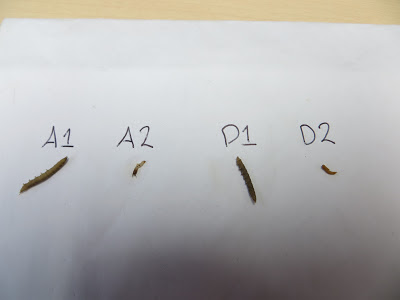Last week I was sampling the lasher (an offshoot of the
Windrush just north or Witney) and its associated fish-pass to try and assess
water quality, my cousin Alex came along as an extra pair of hands and official
photographer.
We attempted to find out the quality of the water by using a
method known as the Biological Monitoring Working Party Score (BMWP Score),
BMWP looks at the aquatic invertebrates in the habitat and, through much clever
work in the past to determine their tolerance to pollution, is given a score
(initially 1-10, however I used the recently revised scores which are more
accurate and have been tested better in real life situations). You then use
these scores to work out the Average Score Per Taxon (ASPT) which tells you
about the quality of the site with relatively fewer samples than you would need
for assessment using purely BMWP.
 The way you sample for BMWP is by using a ‘Three-Minute
Kick-Sample’. This entails standing with a net downstream of your feet by an
inch or two and stomping and kicking the sediment, hoping to disturb any
invertebrates there which will then hopefully drift into the net. The waders
are optional but I couldn’t resist the stylistic appeal.
The way you sample for BMWP is by using a ‘Three-Minute
Kick-Sample’. This entails standing with a net downstream of your feet by an
inch or two and stomping and kicking the sediment, hoping to disturb any
invertebrates there which will then hopefully drift into the net. The waders
are optional but I couldn’t resist the stylistic appeal.
The ASPT scores for the three sites sampled all pointed to
excellent water quality but the results do need to be taken with a pinch of
salt. The sites were only sampled with a solitary 3 minute kick sample each,
this means that the results could be entirely anomalous. But the results that
we did achieve were excellent which is always a nice result to get.

Samples of fly larvae from the river
I also went back later in the week to measure the flow rate of the fish pass as our contact at West Oxfordshire District County Council was worried that it was too fast. The environment agency states that anything slower than 3.5m/s is fine for almost all fish and the average reading I took was a leisurely 0.55m/s so based on this brief initial assessment there are no worries on that front either.
No comments:
Post a Comment